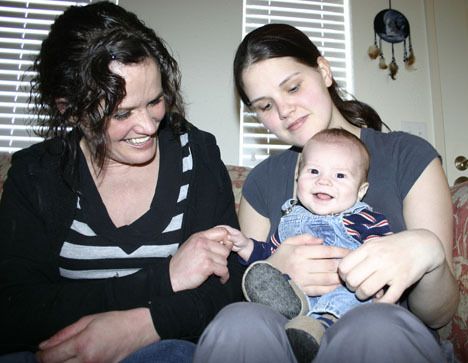Vashon HouseHold has created the first apartment units on the Island permanently assigned to housing homeless families — five units at the organization’s newly refurbished Mukai Commons just west of the Post Office.
And Gail Guthrie, for one, says she’s deeply grateful.
Gail, her daughter Amber Guthrie and Amber’s four-month-old son Joshua Guthrie moved into the tidy two-bedroom apartment a month ago after leaving a living situation where the two women sometimes shared a bedroom or one of them slept on a couch — a set-up they were on the verge of losing altogether.
During an interview last week, as she bounced her grandson on her knee or cuddled him close, Gail said she continues to marvel over her new home — its freshly installed carpeting, shining appliances and helpful managers.
“Everything is new. It’s safe here. It’s quiet,” Gail said.
“We’ve got a good home and a good place for the baby to grow up,” she added. “I’m so grateful.”
Vashon HouseHold is months away from completing its $1.4 million overhaul of the apartment building on S.W. 178th Street, a complex that was long considered an eyesore as well as a site for illegal drug activity. It expects to complete the makeover in June.
The new project, 20 one- and two-bedroom units, represents the nonprofit organization’s second venture into the world of low-income family housing. But it also stands as an important milestone for the Island, providing the first housing permanently set aside for families and individuals considered homeless.
Chris Szala, Vashon HouseHold’s executive director, said it was a big step when the organization decided to include units set aside for homeless people, a group that often has many other needs, he noted. What’s more, there are a lot of stereotypes about homeless people — “a lot of negative connotations,” he said.
But the organization recognized the enormous need on Vashon. It also began working closely with Vashon Youth & Family Services; its VIVA program is geared toward providing basic services to Islanders, including job counseling and other services that address some of the root causes of homelessness.
“That’s the kind of partnership we want,” Szala said.
Now, two of the five units are complete, with residents in both of them. The other three, which should be ready for occupancy in a month or two, have waiting lists.
Advocates for the homeless say they’re grateful for the new units, considered critical in helping the Island’s small but constant population of people without homes. VYFS has 10 vouchers for Section 8 housing for homeless people — but the vouchers only last for five years, and it can be difficult to find landlords that will accept the vouchers, said Diane Kjellberg, the interim head of the agency.
At Mukai Commons, she noted, the housing is secure and permanent. “They can stay there for however long they need,” she said.
“We’re thrilled about it,” said Emma Amiad, one of the leaders of Vashon’s Interfaith Council on Homelessness, an organization that has worked with the Guthries on their housing needs.
Nancy Vanderpool, another Islander active in the Interfaith Council, agreed. “It’s putting a dent in homelessness,” she said.
Szala, who has worked with homeless people for more than 20 years, said he’s repeatedly witnessed the difference a home can make in a person’s life — especially if that home comes with other needed services.
“It really can be life-changing,” he said.
Vashon HouseHold, he added, is now looking at what other services it might need to offer up so as to provide the so-called wrap-around services considered critical in ensuring success for people who have struggled with homelessness.
“We’re looking at gaps and working with a lot of other social service providers on the Island to identify those gaps,” he said. “Vashon HouseHold has not provided social services. But I’ve got to be honest with you, we’re looking at doing that. … We’re attempting to see what the Island needs in terms of dealing with these gaps.”
For the Guthries, the home alone is helping them enormously, both Gail and Amber said.
Their previous home — a house they shared with others on Wax Orchard Road — was both cramped and expensive. Initially, Amber shared a room with her mother and then was able to sleep on the couch, giving the two some needed space. The Interfaith Council then stepped in, Gail said, and gave them enough money to rent two rooms in the house, which was critical after Amber had her baby.
But that was a one-time assistance, the two women said. They were thrilled when Debbie Rieschl, who coordinates VIVA at VYFS, worked with them to secure a unit at Mukai.
Gail, who works as a waitress, said she’s made mistakes in her life and didn’t parent her three children as she should have. Now, with a secure home and her daughter and her grandson living with her, she feels as though her life has started over.
“That’s what this is,” she said, “a second chance on life.”



